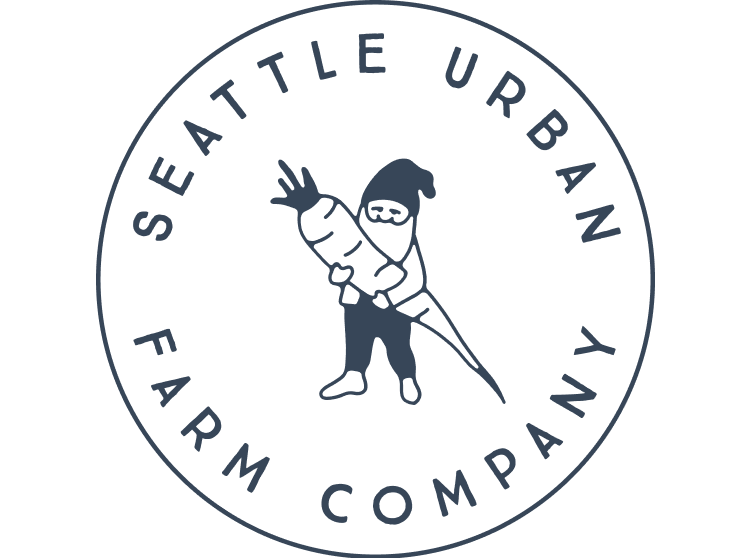By Skip Mackintosh, Farm Manager at the Seattle Urban Farm Co. Urban Fringe Farm
At Seattle Urban Farm Co., we are all about creating highly productive urban landscapes, and we don't often have the luxury of allowing large swaths landscapes to be given over to weeds, but we don't want to dismiss the benefits they can provide. Weeds can be a good thing. It's seems a little counter intuitive as a gardener/farmer to say, but in a lot of ways they really are. Over the past year I started working on our certified organic Urban Fringe Farm in Woodinville. I thought it would be interesting to bring the farm experience back to the backyard by sharing some of what I've learned. The weeds on our farm have been nothing short of challenging to tame, but as I began to study the enemy, I started to realize they are just the opposite of an enemy.
Weeds contribute in a number of ways to the success of a diverse, self-sustaining and productive garden. When dealing with any weed, control is key to deterring garden headaches. Make sure to pay close attention to your weeds. When they flower, that means they're getting ready to put out their seeds. You don't want to encourage copious amounts of seeds to scatter across your garden. Weed seeds will find their way in no matter what you do, so cut back or use edible parts of your weeds before they reach this stage of growth. By turning the weeds into your soil you're adding organic matter. Organic matter promotes nutrient and moisture retention and helps bring or keep worms in the garden. Some weeds also replenish nutrients and have the ability to discourage pests and disease. If you do turn your garden weeds into your soil, be sure you give the plant matter 8-10 weeks to decompose before planting.
Here is a short incomplete list of edible and beneficial weeds common at our farm and in the Seattle area.
This list is intended as a reference and not as a guide to eating uncommon plants. Some forgeable edibles can cause health problems even if they are deemed edible. Always consult an expert in plant science and a physician if you are thinking about eating unfamiliar foods.
Clover - Establishes nitrogen in the soil, a key ingredient in maintaining healthy vegetable crops. It also acts as a ground cover to suppress and control other weeds.
Dandelion - Dandelions are companions for tomatoes and some grains. They also attract honeybees, our illustrious pollinators. They draw up nutrients from deep within the soil so our crops can benefit from nutrients hidden farther below the surface. Additionally, all of its parts are edible. A good source of potassium and vitamins A and C. The roots can be dried and used for tea or roasted as a coffee substitute.
Wild Mustard - Releases naturally occurring bio-toxic compounds. When incorporated into the soil at the right time it acts as an organic fumigant for a number of pests and diseases. Seeds and leaves are edible. It also attracts ladybugs and traps various pests, including aphids.
Wild Vetch - Another nitrogen fixer, like clover. Vetch also acts as a ground cover that can harbor beneficial beetles.
Chickweed - Raw leaves are edible but can prevent important nutrient uptake if eaten in excess. Excellent ground cover.
Lamb's quarter (Pigweed) - Leaves and shoots are edible. It also prevents erosion and deters leaf miners.
Wood Sorrel - An edible clover-like ground cover. Wood Sorrel has a sour citrus taste and is high in vitamin C. As with most edible weeds, eating in excess is not a good idea, but they sure do taste good as a snack on a hot day.
Pineapple weed - Similar to Chamomile, Pineapple weed has an edible flower. The plant can be turned into a powder to help prevent meat from spoiling and to keep flys away.
Plantain - Like Pigweed, young Plantain leaves are edible and their seeds are best used for grinding up to make flour. You can also eat leaves finely chopped and cooked to remove fibers.
Thistle - The roots are best when roasted or boiled. Stems are edible after removing the prickles and are best for eating after boiling.
With all of the great things my garden is already growing, I'm not a big weed eater, but I love knowing that there are so many possibilities for food and natural remedies in our everyday world. My takeaway from this concept is this: Weeds that encourage pollinators and beneficial predators in the garden are okay by me. But even if they don't attract the good things and we have to get rid of them more frequently, continuously adding free organic matter and feeding the worms is equally as great. Sometimes it just takes a new perspective to see the good right in front of you.
At SUFCo, Skip is the Farm Manager at SUFCo's Urban Fringe Farm. During the fall and winter months, he is part of our skilled installation team and spends most of his time building urban farms all around the Seattle area. In 2012 Skip worked on a small mixed organic vegetable farm in Oakville, WA. This experience served as a crash course in all aspects of small scale farming in Western Washington and was a springboard into his position as an installation crew member.



